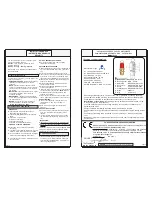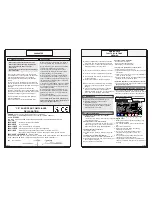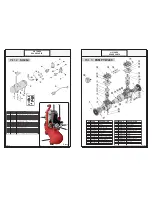
3 - FOR YOUR SECURITY
Ü
The air delivered by your compressor allows you
to use many tools, follow conditions, advice and
in certain cases RESTRICTIONS OF USE for air
tools using compressed air.
2 - INSTRUCTIONS, USES ADVICE
To obtain the best efficiency, please respect the
following indications:
- HORIZONTAL SETTING: the compressor must be
installed on a horizontal plane, 15 ° angle is
allowable.
- PLACE: Use the compressor indoors or under
shelter, do not expose it to the rain or near water
jets. Do not use the compressor in an explosive
atmosphere.
- VENTILATION: The compressor must be in a place
which allows ventilation, do not cover the
ventilation openings.
- TEMPERATURE: Use the compressor between
(+ 5°C and +35°C) (Otherwise, there are risks for
the electrical motor.)
- TENSION: Check that the sector tension and
tension indicated on the label are the same :
(Single phase:230 Volts - 50 Hz)
INSTALLATION AND SITE
INSTRUCTIONS, USE ADVICE
SECURITY
You have just bought your air compressor, it will
give you appreciable services.
Inflation: Tyres - Balloons - Swimming pools -
inflatable boats etc ......
Blowing - Dusting - Painting - Stapling…
Before using it, it is imperative to read ENTIRELY
the present NOTE.
1 - INSTALLATION AND SITE
- ADJUSTMENT OF PRESSURE:
- AFTER USING:
Ü
Never stop by disconnecting the electrical cable.
Ü
Never leave the compressor power connected under
pressure.
Ø
Switch the interruptor in "Off" position (Ref: A, Pict.1)
Ø
Empty the tank
Ø
Drain the tank (Ref: P, Pict.1)
Ø
Disconnect the electrical cable.
Ü
Adjust the pressure of use and the consumption of
air to the characteristics of the tools you wish to
use.
(See the documentation provided with your tools).
Ü
The quantity of air consumed depends on the type
of tool used: do not use a tool consuming more
than 60% of the possibilities of your compressor.
Ü
The pressure controller is adjusted in factory and
needs no re adjustment.
Ü
Pressure gauge (Ref: C, Pict.1) indicates the
pressure inside the tank.
Ü
Pressure gauge (Ref: U, Pict.1) indicates the
useful exit air pressure.
To adjust the output of air pressure , it is necessary to
turn the pressure reducer button (Ref: B, Pict.1)
In clockwise direction to increase pressure, and
opposite to decrease it.
You must use the tool only when the pressure in the
tank is higher than the pressure of use of the tool.
Ü
To use your compressor correctly, only use it
intermittently, i.e. 60% of use for 40% of
downtime.
Beyond this limit, the engine risks overheating
problems.
- PRECAUTIONS TO PAINT:
If the electric motor and the interior of the pump are
dirty, your compressor life expectancy will be
reduced:
Ü
In order to avoid this problem, only move away
the compressor by lengthening the tube of your
tool.
- OPERATING TIME:
Page 2
Page 7
- USING A PNEUMATIC EXTENSION:
Ü
For pressures higher than 7 bar, use pipes
reinforced with steel braid.
Ü
Check that the compressor has not been
damaged during the transport.
Ü
The switch (Ref: A, Pict.1) must be in position
«Off».
Ü
Connect in a socket-outlet:
- Of 16 Amps under 230V.
- Connected to the ground.
- Connected to a differential protection.
- USING AN ELECTRIC EXTENSION:
- BEFORE USE:
Ü
Please only use an extension if absolutely
necessary.
We recommend the following dimensions: 5 meters
maximum length with section of wire of 2,5mm ².
Ü
Too small diameter wire sections and big lengths
would cause serious damage to the engine.
Ü
It is better to extend air pipe, which also will give
you stock of air.
F.MURET
The President
Buc the 2015-03-03
- Manufacturer's logo
- PT = Setting pressure 8 bar
- Q = Maximum opening flow 1895 l/min
- Input threading : 1/4" gaz
- Input pressure rated : 25 bar
- Opening diameter : 6 mm
- Opening area : 28,26 mm²
- Fluid type : Compressed air
- Working temperature : NBR -10°C +90°C
- The used materials fit to good functioning according to the working conditions and the
aforementioned fluids.
- The technical data that identify the safety valve are indicated on the plate.
- The mechanical locking of the setting is obtained by the application of a glue-sealing (Loctite
270).
- The setting of the safety valve is secured by a final punching on the body of the safety
valve.
- Satisfactory results were obtained after the final check and after the hydraulic test carried
out at 37,5 bar.
- The setting of this safety valve, carried out at T°=20°C, garantees an opening beginning
and a mawimum outflow according to the indicated values in the technical characteristics.
- These values are recalled on the identification sticker set on the security valve.
- Identification of the marking: PT= Setting pressure D= Opening diameter and Q = Flow
to full opening for the compressed air.
AUTOMATIC SAFETY VALVE CERTIFICATE
FOR SIMPLE PRESSURE TANKS CATEGORY 1
R
EF
: 631408
TECHNICAL CHARACTERISTICS:
USED MATERIAL:
a -Body valve :BRASS UNI EN 12164
b -Rubber gasket :NBR - VITON
c -Obturating :BRASS UNI EN 12164
d -Spring stop :BRASS UNI EN 12164
e -Spring :STEEL C98 UNI 3823
f -Conical tapped :BRASS UNI EN 12164
g -Plate :PLASTIC
h -Ring :STEEL C75
"CE" EUROPEAN COMPLIANCE DECLARATION
WE DECLARE UNDER OUR RESPONSABILITY THAT THIS VALVE COMPLIES WITH
THE SAFETY RULES REQUIRED IN KEEPING WITH:
European directive : 2006/42/CE - 97/23/CE (This soupape was classified
according to the annex II § 2 and therefore evaluated according to unit A)
This security valve is uniquely destined to equip simple pressure tanks
or equipments category 1.
Applied rule : ISO 4126-1
PRODIF :
ZAC du Pré Clos - 500 rue Clément Ader - 78530 BUC






















